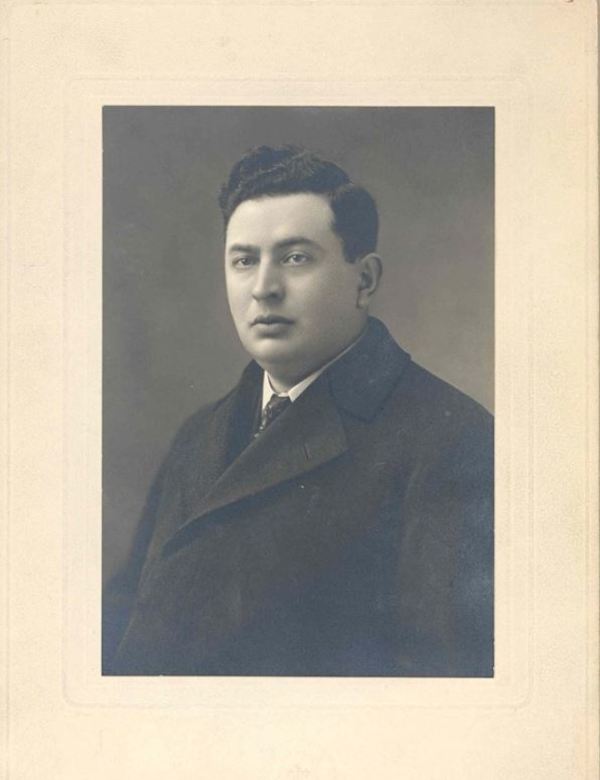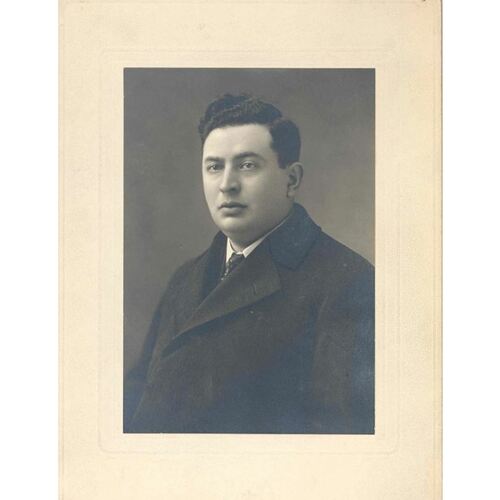
Source: Link
DWORKIN, HENRY, businessman, socialist, and community activist; b. 1885 in Ekaterinoslav (Dnepropetrovsk, Ukraine), son of Solomon Dworkin, a merchant, and Anny Rubens; m. 20 Aug. 1911 Dorothy Goldstick in Toronto, and they had a daughter; d. there 14 Jan. 1928.
By some accounts Henry Dworkin came to Toronto in 1905, following his elder brother Edward, who worked in a paper-box factory and reputedly subsisted on bread and tea in order to bring him to Canada. According to Henry’s marriage registration, however, he arrived on 1 Jan. 1910. Between 1910 and 1913 directories show the Dworkin brothers – Henry, Edward, Sholem, and Samuel – involved in two enterprises: Dworkin’s Jewish Advertising Bureau, opened by Sholem by mid 1909 on Elizabeth Street, in an area heavily populated by immigrants, and a wholesale tobacco business, Independent Cigar Stores, on Elizabeth and Queen.
Within a year or two Henry took over the management of the Advertising Bureau, a stationery shop, foreign-language printery, and agency for Jewish and foreign newspapers. Also known from 1913 as Dworkin Brothers (Henry and Sholem), the bureau, which included a telegraph agency, distributed the Yiddisher Zhurnal/Daily Hebrew Journal (Toronto), the Canadian Jewish Times (Montreal), and two major Jewish papers from New York, the Jewish Daily Forward/Vorwärts and the Jewish Daily News/Jüdisches Tageblatt. The bureau had quickly become a Mecca for Jews from eastern Europe and for the unemployed, who hoped to meet others who might help them find work. Henry was remembered for offering his room to those with no place to sleep and for distributing bread. At some point he and Edward tried running a small restaurant on Bay Street but, as journalist Abraham Rhinewine* recalled, it failed because everyone was given food regardless of ability to pay.
By early 1920 Henry and Edward had opened a shop on Dundas Street under the name E. and H. Dworkin, tobacconists, confectioners, and steamship agents. Henry had probably been operating as an agent for a number of years. After World War I, according to one account, when funds he had sent to Poland, to cover the passage for relatives of clients, proved insufficient because of inflation, he travelled to Europe to set things in order, enduring arrest and paying the difference out of his own pocket. He prospered, even though clients frequently did not reimburse him.
Dworkin’s agency was driven as much by his philanthropic sympathies as by his need to earn a living. His charitable nature, coupled with his socialist ideology, impelled him to activity within, and outside, the Jewish community. He was joined in his outlook by his wife, whom he had married in 1911 in a ceremony conducted by Maurice Kaplan, cantor at McCaul Street Synagogue. A Torontonian who had received a certificate in midwifery in Ohio in 1909, Dorothy had become on her return the first nurse and a guiding light at the Jewish Dispensary, set up on Elizabeth Street by the Hebrew Ladies’ Maternity Aid and Child Welfare Society. On Henry’s death she would assume his part in E. and H. Dworkin.
Dworkin’s shops always buzzed with socialist conversation and unionist planning as well as philanthropic initiative. In 1915 he was among the proponents of a tag day to assist Jewish war victims in Russia, an activity ultimately forbidden by the city. He was nominated by the socialists as an aldermanic candidate in 1916, but declined in favour of James Simpson*, a gentile labour leader. (He would run in a later election but would be defeated.) Dworkin served on the provisional board of the Federation of the Jewish Philanthropies of Toronto when it was organized later in 1916. In 1919 he was a delegate to the first Canadian Jewish Congress. In a photograph taken that year of him and other volunteer collectors for the Conference for Jewish War Sufferers, he appears as a well-dressed, heavy-set man. His work was matched by that of his wife. Following the Toronto General Hospital’s refusal to provide a wing with a kosher kitchen and Yiddish-speaking staff, she and others headed the drive to establish in 1922 the Toronto Jewish Convalescent and Maternity Hospital (renamed Mount Sinai in 1923). When antisemitism became evident at Toronto’s Labor Temple in the 1920s, Henry founded the Labour Lyceum on Spadina Avenue to house Jewish unions; he was chairman of its board of directors at the time of his death.
Dworkin was on his way to a meeting there in January 1928 when he was struck by an automobile and fatally injured. His funeral demonstrated his popularity: an overflow of several thousand people, Jews and non-Jews, civic officials and workers, stood in extreme cold in front of the Lyceum, and police reinforcements had to be called in to control the crowd.
AO, RG 22-305, no.58523; RG 55-17-60-30, no.22983; RG 55-17-60-31, nos.26024–25 CP; RG 55-17-60-46, nos.7971 CPE, 7972 CP; RG 80-5-0-506, no.21763. Ontario Jewish Arch. (Toronto), “Canadian Jewish Congress ballot for Toronto” (1919); MG 6/E1 (Betty Lindgren papers). Canadian Jewish Times (Montreal), 21 June 1912. Evening Telegram (Toronto), 20 Jan. 1928. Toronto Daily Star, 16 Jan. 1928. Yiddisher Zhurnal/Daily Hebrew Journal (Toronto), 15 Jan. 1928. Canadian Jewry, prominent Jews of Canada . . . , ed. Zvi Cohen (Toronto, [1933]). Directory, Toronto, 1906–29. Abraham Rhinewine, Der Yid in Kanada [The Jew in Canada] (2v., Toronto, 1925–27), 1. S. A. Speisman, The Jews of Toronto: a history to 1937 (Toronto, 1979).
Cite This Article
Stephen A. Speisman, “DWORKIN, HENRY,” in Dictionary of Canadian Biography, vol. 15, University of Toronto/Université Laval, 2003–, accessed February 19, 2026, https://www.biographi.ca/en/bio/dworkin_henry_15E.html.
The citation above shows the format for footnotes and endnotes according to the Chicago manual of style (16th edition). Information to be used in other citation formats:
| Permalink: | https://www.biographi.ca/en/bio/dworkin_henry_15E.html |
| Author of Article: | Stephen A. Speisman |
| Title of Article: | DWORKIN, HENRY |
| Publication Name: | Dictionary of Canadian Biography, vol. 15 |
| Publisher: | University of Toronto/Université Laval |
| Year of publication: | 2005 |
| Year of revision: | 2005 |
| Access Date: | February 19, 2026 |



